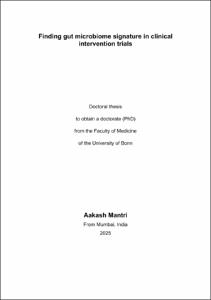Mantri, Aakash: Finding gut microbiome signature in clinical intervention trials. - Bonn, 2025. - Dissertation, Rheinische Friedrich-Wilhelms-Universität Bonn.
Online-Ausgabe in bonndoc: https://nbn-resolving.org/urn:nbn:de:hbz:5-81161
Online-Ausgabe in bonndoc: https://nbn-resolving.org/urn:nbn:de:hbz:5-81161
@phdthesis{handle:20.500.11811/12826,
urn: https://nbn-resolving.org/urn:nbn:de:hbz:5-81161,
doi: https://doi.org/10.48565/bonndoc-511,
author = {{Aakash Mantri}},
title = {Finding gut microbiome signature in clinical intervention trials},
school = {Rheinische Friedrich-Wilhelms-Universität Bonn},
year = 2025,
month = feb,
note = {The gut microbiome plays a crucial role in the gut brain axis, especially by modulating the immune system, influencing metabolism, protecting against pathogens, and impacting mental well-being. Therefore, it can be modulated through various lifestyle changes, medications, and clinical interventions for specific metabolic goals. The aim of this thesis is to identify gut microbiome signatures in different clinical interventions and explore their potential to enhance overall health outcomes.
In our first clinical intervention, we use synbiotics to modulate specific microbiome signatures that could potentially delay the progression of Metabolic-Dysfunction-Associated Fatty Liver Disease. Regression analysis revealed how baseline microbiome composition can influence social decision-making through the dopamine precursor tyrosine. Additionally, partial least squares analysis demonstrated that a personalized synbiotic approach can improve gut health by targeting participants with insufficient dietary fiber intake.
In this thesis, we also explored the impact of dietary interventions, such as oats, in participants with metabolic syndrome. Using partial least squares model analysis, we identified gut microbiome and multi-omics signatures that explain the physiological mechanisms behind the cholesterol-lowering effects of these interventions. In particular, the bacterium Ruminococcus torques was associated with HDL-cholesterol. We also demonstrated that oats could improve gut barrier integrity in participants with metabolic syndrome traits by altering microbiome signatures, enhancing zonulin and short-chain fatty acid levels.
In conclusion, our findings indicate that the gut microbiome plays an essential role in enhancing our metabolism through various interventions and can be analyzed to discover new bacterial biomarkers. We also conclude that there is a need for a personalized machine learning model utilizing microbiome or multi-omics datasets to predict dietary responses accurately.},
url = {https://hdl.handle.net/20.500.11811/12826}
}
urn: https://nbn-resolving.org/urn:nbn:de:hbz:5-81161,
doi: https://doi.org/10.48565/bonndoc-511,
author = {{Aakash Mantri}},
title = {Finding gut microbiome signature in clinical intervention trials},
school = {Rheinische Friedrich-Wilhelms-Universität Bonn},
year = 2025,
month = feb,
note = {The gut microbiome plays a crucial role in the gut brain axis, especially by modulating the immune system, influencing metabolism, protecting against pathogens, and impacting mental well-being. Therefore, it can be modulated through various lifestyle changes, medications, and clinical interventions for specific metabolic goals. The aim of this thesis is to identify gut microbiome signatures in different clinical interventions and explore their potential to enhance overall health outcomes.
In our first clinical intervention, we use synbiotics to modulate specific microbiome signatures that could potentially delay the progression of Metabolic-Dysfunction-Associated Fatty Liver Disease. Regression analysis revealed how baseline microbiome composition can influence social decision-making through the dopamine precursor tyrosine. Additionally, partial least squares analysis demonstrated that a personalized synbiotic approach can improve gut health by targeting participants with insufficient dietary fiber intake.
In this thesis, we also explored the impact of dietary interventions, such as oats, in participants with metabolic syndrome. Using partial least squares model analysis, we identified gut microbiome and multi-omics signatures that explain the physiological mechanisms behind the cholesterol-lowering effects of these interventions. In particular, the bacterium Ruminococcus torques was associated with HDL-cholesterol. We also demonstrated that oats could improve gut barrier integrity in participants with metabolic syndrome traits by altering microbiome signatures, enhancing zonulin and short-chain fatty acid levels.
In conclusion, our findings indicate that the gut microbiome plays an essential role in enhancing our metabolism through various interventions and can be analyzed to discover new bacterial biomarkers. We also conclude that there is a need for a personalized machine learning model utilizing microbiome or multi-omics datasets to predict dietary responses accurately.},
url = {https://hdl.handle.net/20.500.11811/12826}
}





